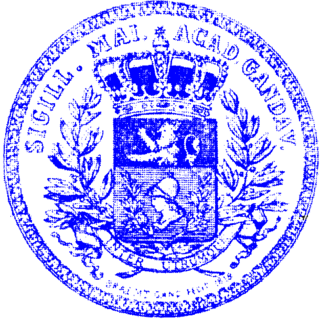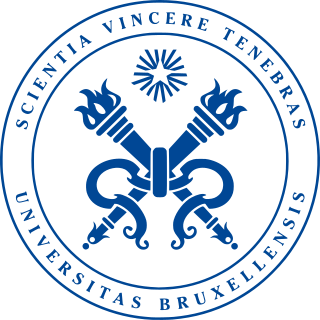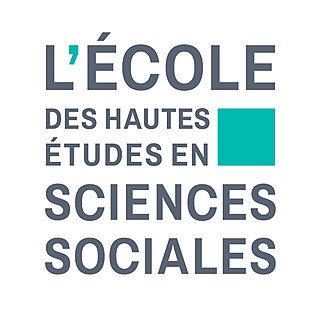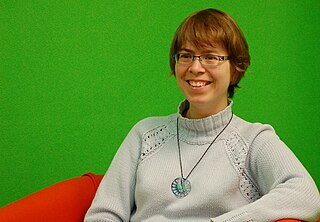Related Research Articles

The University of California, San Francisco (UCSF) is a public land-grant research university in San Francisco, California. It is part of the University of California system and is dedicated entirely to health science and life science. It conducts research and teaching in medical and biological sciences.

Ghent University is a public research university located in Ghent, Belgium.

The Vrije Universiteit Brussel is a Dutch and English-speaking research university in Brussels, Belgium. It has four campuses: Brussels Humanities, Science and Engineering Campus, Brussels Health Campus, Brussels Technology Campus and Brussels Photonics Campus.

The Université libre de Bruxelles is a French-speaking research university in Brussels, Belgium. It has three campuses: the Solbosch campus, the Plaine campus and the Erasmus campus.

The University of Sunderland is a public research university located in Sunderland in the North East of England. Its predecessor, Sunderland Technical College, was established as a municipal training college in 1901. It gained university status in 1992. It now has campuses in Sunderland, London and Hong Kong, and has about 27,000 students.

The School for Advanced Studies in the Social Sciences is a graduate grande école and grand établissement in Paris focused on academic research in the social sciences. It is regarded as one of the most prestigious institutions of graduate education in France. The school awards Master and PhD degrees alone and conjointly with the grandes écoles École normale supérieure, École polytechnique, and École pratique des hautes études.

The University of Liège, or ULiège, is a major public university of the French Community of Belgium founded in 1817 and based in Liège, Wallonia, Belgium. Its official language is French.
The Francqui Prize is a prestigious Belgian scholarly and scientific prize named after Émile Francqui. Normally annually since 1933, the Francqui Foundation awards it in recognition of the achievements of a scholar or scientist, who at the start of the year still had to be under 50. It currently represents a sum of 250,000 Euros and is awarded in the following three-year rotation of subjects: exact sciences, social sciences or humanities, and biological or medical sciences.

UCLouvain Saint-Louis Brussels is an autonomous university campus specialized in social and human sciences part of UCLouvain and based in Brussels, Belgium.

Philippe J. Sansonetti is a French microbiologist, professor at the Pasteur Institute and the Collège de France in Paris. He is the director of the Inserm Unit 786 and of the Institut Pasteur laboratory Pathogénie Microbienne Moléculaire.
Jean-Maurice Dehousse was a Belgian politician. He was a Member of the European Parliament between 1999 and 2004 as a member of the Parti Socialiste. Dehousse was the first and third Minister-President of Wallonia.
Sir Stewart Thomas Cole is a British/French microbiologist. He was the Director General of the Pasteur Institute since January 2018 to December 2023.

Emmanuelle Marie Charpentier is a French professor and researcher in microbiology, genetics, and biochemistry. As of 2015, she has been a director at the Max Planck Institute for Infection Biology in Berlin. In 2018, she founded an independent research institute, the Max Planck Unit for the Science of Pathogens. In 2020, Charpentier and American biochemist Jennifer Doudna of the University of California, Berkeley, were awarded the Nobel Prize in Chemistry "for the development of a method for genome editing". This was the first science Nobel Prize ever won by two women only.

Yaël Nazé is a Belgian astrophysicist, author and professor at the University of Liège. She specializes in massive stars and their interactions with their surroundings. In her research, she has worked with images and data collected from various space telescopes and has worked on creating new observation satellites.

Harkishan Singh was Professor Emeritus at the Panjab University. He was a well recognized pharmaceutical academic, medicinal chemistry researcher and science historian. He had more than half a century experience in his respective fields to his credit. He worked at the Banaras Hindu University, University of Saugar, and the Panjab University in India, and abroad at the University of Maryland, University of Mississippi and the University of London.

Lucien Antoine Maurice Brouha was a Belgian rower who later became a notable exercise physiologist in the United States. He won three medals at European Rowing Championships between 1921 and 1924. He attended the 1924 Paris Olympics but his team was eliminated in the repechage. In his early medical career, he helped develop an early pregnancy test at the University of Liège. From the 1930s, his academic interest shifted towards exercise physiology. Between 1934 and the outbreak of World War II, Brouha travelled on scholarships on several occasions to conduct research at universities in the United States. Having been imprisoned during World War I, he left Belgium for Paris due to increasing tension with Nazi Germany in early 1940.
Christine Jacobs-Wagner is a microbial molecular biologist. She is the Dennis Cunningham Professor of Biology and Microbiology and Immunology at Stanford University. Jacobs-Wagner's research has shown that bacterial cells have a great deal of substructure, including analogs of microfilaments, and that proteins are directed by regulatory processes to locate to specific places within the bacterial cell. She was elected to the National Academy of Sciences in 2015 and has received a number of scientific awards.

The Marie Haps Faculty of Translation and Interpreting is a faculty of Saint-Louis University, Brussels (UCLouvain) located on its own campus in Brussels' European Quarter, in the municipalities of Ixelles and the City of Brussels. It is Belgium's oldest translation school, founded in 1955, and the fifth faculty of Saint-Louis University, Brussels, which it fully merged with in 2015.

Charles Delvaux de Fenffe, (July 25, 1782, in Rochefort - November 14, 1863, at the Fenffe Castle was a Belgian doctor of medicine, doctor of sciences, and professor at the University of Liège. He served as the sixteenth rector of the university from 1832 to 1833.
References
This article needs additional or more specific categories .(June 2023) |